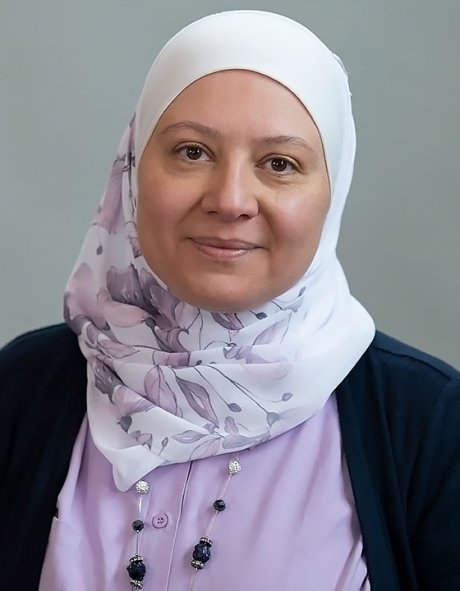The Q&A: Assist. Prof. Hadid Addresses Issues in Teaching and Learning a Second Language
- News
- The Q&A: Assist. Prof. Hadid Addresses Issues in Teaching and Learning a Second Language

“The beauty of the language courses at RIC is that we create an atmosphere where students can feel safe to try out the new language,” says Assist. Prof. Hadid.
Rhode Island College Assistant Professor and Interim Director of the TESOL Program Alia Hadid is fluent in English and Arabic (her native language) and studied German, Swahili and French. She has taught English as a second language for more than 20 years to students ranging from the age of six to adults both inside and outside the United States.
In this Q&A, Hadid discusses the issues teachers and learners face and how they can overcome them.
QUESTION: What is the difference between acquiring a second language versus learning a second language?
HADID: Acquisition is unconscious. It’s when you pick up a language without even realizing it. Learning a second language is when the grammatical rules of a language are studied. A lot of what is happening in the classroom today is a combination of both.
QUESTION: What are the obstacles adult students face when learning a second language?
HADID: Learning is more difficult for adults because adult learners tend to transfer a lot of what they know of their native language into the second language. As an adult, you know the rules of your native language. But when you compare those rules to the second language, it creates a challenge because the rules don’t match. It’s easier for young people to learn a second language because they’re learning their first language at the same time.
QUESTION: As a bilingual, I sometimes hesitate to talk to native speakers out of fear of making a mistake. How does one overcome that fear?
HADID: For some learners, the fear has to do with the racism and discrimination they faced when they came to this country. In the United States, we have immigrants and refugees who’ve been through a lot. Along with learning the language, there are many other hurdles they face, like trying to fit into this society and understand a new culture. Let’s face it, a lot of them have been made fun of.
Basically, my work as an instructor is to help boost my students’ self-confidence. I ask them, “What’s going to happen if you make a mistake? Nothing.” As a teacher, I make sure everyone speaks, particularly those who tend to be quiet. I make sure I hear from them when I ask a question so that they can shine. If they can speak in the classroom, they can speak anywhere.
QUESTION: What causes the mind of a learner to go blank when they’re trying to communicate?
HADID: It might depend on the dynamics between the speakers. If you feel that someone is going to judge you or criticize you, you’ll shut down and have difficulty remembering what you want to say. But if you’re interacting with someone who is friendly, who smiles at you and encourages you, you’ll feel relaxed and it will be much easier for you to express yourself.
It may also be because you speak two languages and have a bigger vocabulary in certain areas. When I have to talk about what I do for a living – education, I can do it better in English because I lack that vocabulary in Arabic. But when I’m talking about my social activities or emotions, I’m better in Arabic. Translanguaging is always there, too. [Translanguaging is mixing languages.]
QUESTION: In the world we live in where technology can translate any language with a click of the mouse and where people who live in our communities are speaking our same native language, is learning English worth the effort?
HADID: Always. Some years ago, I had a student who had been living here for more than 30 years and never felt the need to learn English because her children and grandchildren spoke Spanish. She decided to learn English because she wanted to feel independent. She didn’t want to depend on others to speak for her. Living in the United States, you can’t be sure that your children or grandchildren will be fluent in your native language. Imagine not being able to communicate with your grandchildren.
QUESTION: What can a learner do to become better in the target language?
HADID: According to research, when you’re learning a language, you need at least 14 instances of the new word to internalize it. If you want to improve your speaking skills, do more than one hour of learning. Listen to the news, watch movies, go out and listen to people talking and communicate with them in their language. Learning a language depends on repetition. You need to use it, be exposed to it and apply it many times before you have full command of it.
QUESTION: In your opinion, what makes a good language teacher?
HADID: I believe language learners themselves are the best teachers because they’ve been through some of the same challenges as their students. Being a caring teacher is just as important as being a knowledgeable teacher. I want my students to feel safe, to feel equal, to feel loved. I want them to know that this is a classroom where they are appreciated and welcomed. As an immigrant myself, opening up to my students about my experiences is important, too. They feel closer to me and that helps them feel connected.
For more information about RIC’s TESOL program, contact Assistant Professor Alia Hadid at ahadid@ric.edu
